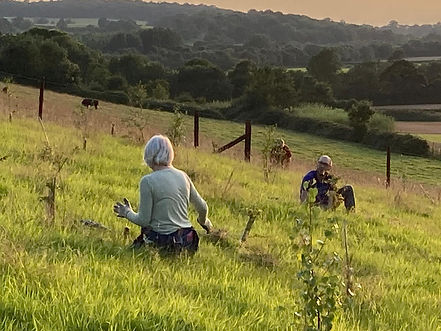The best way to stay in the loop with our volunteering opportunities is to join our WhatsApp group. The LANCE Trust Volunteer WhatsApp group aims to be a network of volunteers and supporters of the Trust. It will be a place where Trustees will post volunteering opportunities and updates. We're keen to grow the group so, please click an option below to join, and extend the invitation to others.
Join our volunteer WhatsApp group to be kept in the know:
We also post all our upcoming volunteering opportunities:
-
In our newsletters (subscribe to those here)
-
On our Facebook page (follow our page here)
Below is the latest opportunities, and examples of past events.
Oak sapling planting
There's a grand, old oak tree in the allotment field in Long Ashton. Last autumn, many of the acorns dropped underneath the tree, took root and - one year later - they're robust saplings, ready to be moved into spaces of their own to thrive.
When: Tuesday 14th October, between 10:00am – 1:00pm (Join for as much/little time as you have)
Meeting point in field: What3Words - robe.raft.bits
(Access via: Theynes Croft, Long Ashton, BS41 9NA)
Equipment: Tools provided, but feel free to bring gloves or spades if you have them.

Hedgerow planting
A collaboration between Bridge Farm, North Somerset Council, the LANCE Trust and the Forest of Avon has brought about the planting of nearly 2km of species-rich hedging that links up two parcels of ancient woodland: Ashton Court and Yewtree Farm.
For more information on the project, read our blog or visit the project page.
We welcomed over 400 volunteers, across many days, to get the project off the ground and to give the plants the best chance at thriving.

Sow wildflowers
We've run multiple wildflower sowing projects, including in schools, Lark Meadow and Peel Park. You can find out more in the FAQs from our wildflower sowing sessions in Peel Park.
Get in touch if you have an idea for a new wildflower meadow and would like our support.

Sapling Care
One of the Trust's first projects was planting a mix of tree saplings on the slopes of Toboggan hill. Over the years, volunteers have also helped us care for the plants, clearing competing foliage etc.
The saplings on Toboggan Hill are fairly well established now, but it's likely we'll have other tree-planting opportunities to gather volunteers for soon.

Reasons to join in
The last few years have been unpredictable and, in many ways, damaging for all of us. We’re now faced with a cost of living crisis along with the dangers faced by the climate change and biodiversity crises too.
It’s easy to feel overwhelmed but research sows that there is increasing evidence that “nature is an important need for many and vital in keeping us emotionally, psychologically and physically healthy”.
In 2020, Public Health England carried out a review that showed “living in a greener environment can promote and protect good health, and aid in recovery from illness and help with managing poor health.
People who have greater exposure to green space have a range of more favourable physiological outcomes. Greener environments are also associated with better mental health and wellbeing outcomes including reduced levels of depression, anxiety, and fatigue, and enhanced quality of life for both children and adults”.
Not only that, but the review states “Green space can help to bind communities together, reduce loneliness, and mitigate the negative effects of air pollution, excessive noise, heat and flooding. Disadvantaged groups appear to gain a larger health benefit and have reduced socioeconomic-related inequalities in health when living in greener communities, so green space and a greener urban environment can also be used as an important tool in the drive to build a fairer society”.
The review also puts a price tag on the true value of green space and, astonishingly, recent valuations have estimated that “£2.1 billion per year could be saved in health costs if everyone in England had good access to green space, due to increased physical activity in those spaces”.
Children, in particular, feel increasingly disconnected from nature and yet, given half a chance, thrive when involved in giving wildlife a helping hand. As the RSPB states “Developing an enduring relationship between people and nature, connecting people, may be critical for future nature conservation”.
The LANCE Trust hopes to facilitate people to act for themselves and work with each other to give nature a boost in Long Ashton and help create wildlife-friendly corridors along the valley to neighbouring parishes and beyond. In doing so, we can help ourselves, develop new skills, increase our knowledge, help wildlife and create a more resilient ecosystem that will help mitigate the impacts of climate change.
